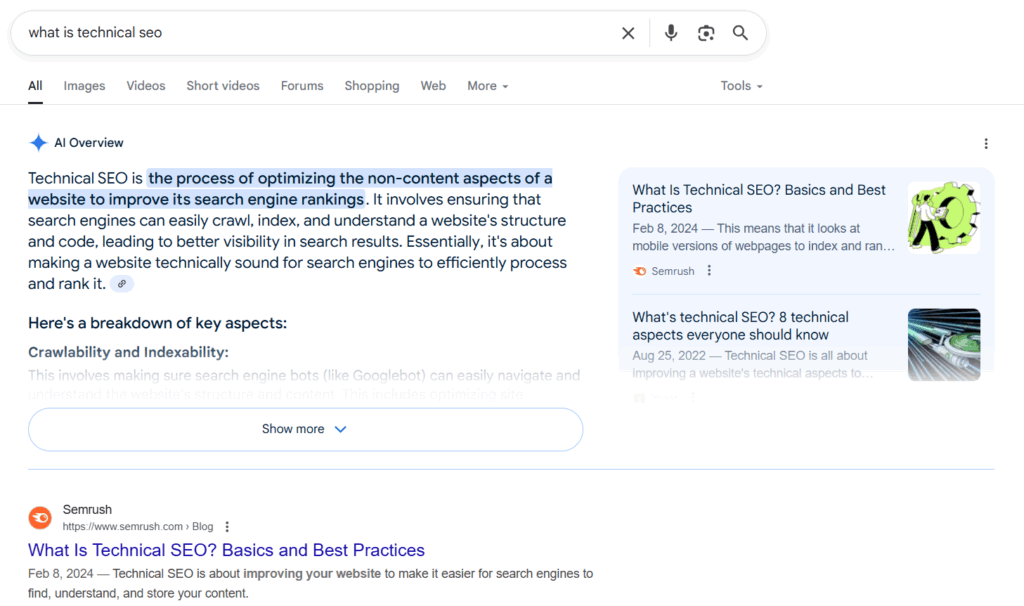Welcome to the Post-Blue-Link Era
The search landscape is evolving rapidly. Traditional search engines like Google once displayed results as ranked lists of blue links where webpages users clicked to find answers. Now, AI-driven overviews, chatbots, and generative engines summarize information from many sources and deliver direct answers.
Why is this important for your business? Because visibility today isn’t just about ranking on a list. If your content isn’t included in these AI-generated summaries, your site will lose traffic, leads, and revenue, even if traditional SEO reports don’t reflect this shift yet.
GEO vs SEO: What’s the Difference?
SEO (Search Engine Optimization)
SEO focuses on optimizing website content to rank highly in traditional search engine result pages (SERPs). The primary objective is to attract organic traffic by targeting relevant keywords being searched for by your clients and improving technical and content quality.
GEO (Generative Engine Optimization) / Synthetic Search
GEO, also known as synthetic search optimization, or AI search optimization, focuses on making sure content is recognized and featured in AI-generated summaries like Google’s AI Overviews, as well as in chat-based search results. Chatbots like ChatGPT and Perplexity are two examples of platforms that use these summaries to provide answers.
Unlike traditional SEO, which often emphasizes keyword matching, GEO prioritizes creating content that directly addresses user queries in an organized, clear, and logical way (using headings, concise sections, and structured data) to help AI systems accurately understand and extract relevant information. Relevance is now determined by understanding, not just keywords.
The Difference Between GEO and SEO

In essence, SEO focuses on ranking individual pages in traditional search results as those familiar lists of blue links. GEO, however, optimizes content to appear in AI-generated summaries and chatbots, where answers are synthesized and presented directly.
As shown in the image above, the search results page is no longer just a list but a summary. Businesses must adapt to this shift or risk becoming invisible.
Is Your Current SEO Strategy Doomed or Durable?
Many companies have historically relied on high-volume, keyword-driven content without fully addressing user intent or quality. This approach leaves companies vulnerable as AI-driven search evolves. To help you assess your strategy, consider these two mindsets:
Fragile Tactics
- Prioritize keyword-first blog creation without addressing real user needs
- Focus narrowly on a single stage of the funnel, or just one channel
- Publish content that is easy to produce but lacks trust and depth
- Prioritize traffic as a metric
Durable Strategy
- Develop content based on customer pain points, jobs-to-be-done, and actionable solutions
- Emphasize EEAT principles: Expertise, Experience, Authority, and Trust
- Structure content to be scannable, with clear sections and rich formatting
- Aim for greater breadth in your topics to accommodate query fan-out
- Implement schema markup such as FAQs, Company information, and reviews
- Ensure that your website has a clear category or taxonomy structure
- Think beyond traditional “blue link” rankings to maximize visibility in AI-driven summaries
- Track your visibility in the AI overviews and LLMs
Red Flags and Green Lights: A GEO Readiness Checklist
Evaluate your current approach by considering:
- Are you focused on addressing customer pain points rather than simply chasing keywords?
- Do you optimize the entire user journey rather than individual pages?
- Is your content organized with clear sections and headings so AI tools can easily understand and summarize it?
- Are you creating content primarily for users, not just algorithms? If SEO did not exist, would you still have created this content?
- Do you view SEO as a strategic priority rather than a collection of disconnected tactics?
Answering these questions honestly can reveal whether your marketing is prepared for the GEO era.
Funnel Strategy: Narrow Channels ≠ AI Visibility
Large Language Models (LLMs) pull information from a wide range of sources and across multiple stages of the customer journey. If your content targets only bottom-funnel keywords (those aligned with immediate purchasing decisions) you risk exclusion from AI summaries that address earlier stages, like research and consideration. The same applies to TOF content.
Expanding your presence across the full funnel is essential to maintaining visibility and influence.
What Now? Assess and Act
If your strategy prioritizes customer-centered, valuable content, and embraces modern SEO and GEO best practices, you have time to adapt and thrive. If your approach depends on manipulative tactics or volume without substance, your visibility may already be compromised.
The opportunity to adjust is time sensitive. Conduct a thorough audit of your content, reconsider your funnel strategy, and recommit to building trust and utility.
Visibility is Now Earned, Not Indexed
GEO is not the end of SEO. It marks the end of ineffective SEO tactics. Companies must elevate their strategies to meet evolving search behaviours by focusing on helpful, authoritative content and robust technical readiness. For companies committed to creating helpful, high-quality content, GEO offers the opportunity to win visibility earlier in the search journey and strengthen their brand authority in a competitive space.
Why Partner with Foundery Digital Marketing Group?
At Foundery, we understand that AI tools are transforming content creation. While AI can accelerate production, it does not replace the need for strategic insight or quality. Our team leverages AI to augment skilled marketers’ capabilities, enabling faster development of insight-driven, high-value content.
We guide organizations in integrating traditional SEO with emerging GEO strategies to maximize digital visibility and lead generation. Partnering with Foundery means positioning your company at the forefront of search innovation and ensuring your marketing efforts remain effective in an AI-driven landscape.
Learn how we help you assess and evolve your marketing to stay competitive.


